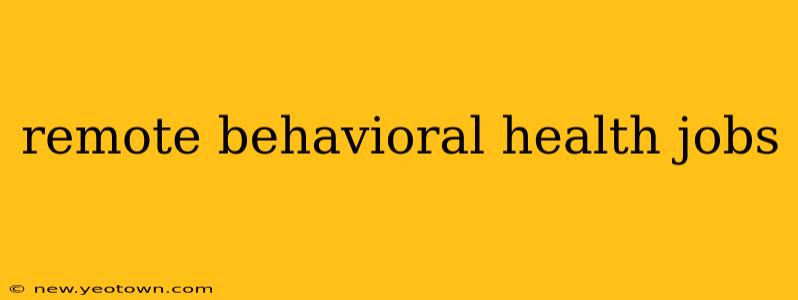The world of behavioral health is experiencing a seismic shift, fueled by technological advancements and a growing recognition of mental health needs. This has led to an explosion of remote behavioral health jobs, offering professionals a flexible and impactful career path. But what exactly does this field entail, and what opportunities await? Let's dive in.
What are Remote Behavioral Health Jobs?
Remote behavioral health jobs encompass a wide range of roles that utilize technology to deliver mental health services to clients remotely. This could be anything from conducting telehealth therapy sessions via video conferencing to providing administrative support for a remote behavioral health practice. Imagine a world where geographical limitations are no longer a barrier to accessing vital mental healthcare – that's the promise of remote behavioral health. It’s a rapidly expanding sector, creating new avenues for both experienced professionals and those just starting their careers.
What Types of Remote Behavioral Health Jobs Exist?
The possibilities are diverse and exciting. Here are some examples:
- Licensed Therapist/Counselor: This is arguably the most prominent role. Therapists conduct online sessions using platforms like Zoom or telehealth-specific software, offering therapy for various conditions such as anxiety, depression, trauma, and addiction.
- Psychiatrist: Psychiatrists provide remote medication management and therapy, often in collaboration with therapists. They leverage technology to monitor patients' progress and adjust treatment plans accordingly.
- Case Manager: Case managers coordinate care for patients, connecting them with resources, tracking their progress, and ensuring they receive the appropriate level of support. This role often involves significant remote communication and coordination.
- Social Worker: Social workers provide remote support and advocacy for individuals and families facing mental health challenges, often navigating complex systems and resources.
- Administrative Staff: Behind the scenes, administrative roles are crucial. This includes scheduling appointments, handling billing, managing patient records, and providing general support to clinicians.
What are the Benefits of Remote Behavioral Health Jobs?
The appeal of remote behavioral health jobs extends beyond the obvious flexibility.
- Flexibility and Work-Life Balance: Set your own hours, work from anywhere with a reliable internet connection, and achieve a better work-life integration.
- Increased Reach: Serve a wider client base, overcoming geographical limitations and expanding access to care for underserved populations.
- Reduced Overhead Costs: No need for a physical office space, saving on rent and other related expenses.
- Technological Advancement: Embrace cutting-edge technologies to enhance the delivery of mental health services.
- Diverse Career Paths: A wide range of roles exist, catering to various skill sets and experience levels.
How to Find Remote Behavioral Health Jobs?
Finding the right role requires a targeted approach. Utilize online job boards specializing in healthcare, use keywords like "telehealth," "remote mental health," and "virtual therapy" in your searches. Networking within the behavioral health community can also be invaluable. Consider specializing in a niche area within behavioral health to improve your marketability.
What Qualifications Are Needed for Remote Behavioral Health Jobs?
Qualifications vary significantly depending on the role. However, many roles require a relevant degree (e.g., Master's in Social Work, Psychology, or Counseling), licensure in your state (or multiple states if working across borders), and experience in providing mental health services. Some positions may also require specific certifications or training in telehealth practices.
Are Remote Behavioral Health Jobs in High Demand?
Yes! The demand for remote behavioral health professionals is exceptionally high and continues to grow rapidly. The ongoing need for accessible and convenient mental healthcare fuels this demand, along with the advantages that remote work offers both employees and employers.
What are the Challenges of Remote Behavioral Health Jobs?
While the advantages are numerous, some challenges exist:
- Technology Issues: Reliable internet connectivity and tech proficiency are essential.
- Maintaining Confidentiality: Strict adherence to HIPAA and other privacy regulations is crucial.
- Building Rapport Remotely: Establishing a strong therapeutic relationship online requires specific skills and techniques.
- Burnout: The nature of the work can be emotionally demanding, and it's crucial to maintain self-care practices.
The field of remote behavioral health is dynamic, rewarding, and essential. It offers a unique opportunity to combine professional fulfillment with personal flexibility, making a significant impact on individuals' lives while enjoying the benefits of a remote work environment. If you're looking for a career that's both fulfilling and adaptable to your lifestyle, a remote behavioral health job may be the perfect fit.

